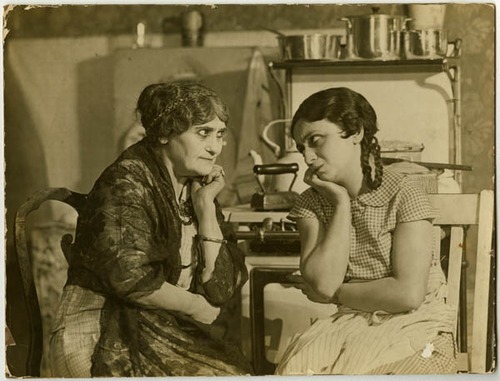We continue Sarah Ganton’s story of Molly Picon, for decades a household name in Yiddish theater and vaudeville, then a Broadway star and performer with the USO, then a radio personality. We’re very fortunate to have a rich record of her life through the archives of the American Jewish Historical Society, one of the five partners of the Center of Jewish History. Join us in celebrating this remarkable, vivacious and endlessly talented woman.

Molly Picon and Regina Prager in Mamale, 1927. [Credit]
Molly Picon officially opened in New York on December 24, 1923, in Yonkele, a Yiddish play written for her by her husband, Jacob. Noted Second Avenue composer Joseph Rumshinsky rewrote the music and lyrics, and Yonkele went up to huge crowds despite Molly’s status as a relative unknown in New York. When the manager of the theater questioned the huge advance ticket sales, Molly’s future audience told him that they had heard about her from relatives in Europe, who had seen her there and written to America to tell their relatives to see her.[1]
Molly spent the next few years opening many new plays on Second Avenue and touring all across the country, and her notices were nearly always rave reviews. One such reviewer wrote of her, “One cannot say that Miss Picon is good looking as stage standards go and surely her simple and untrained cavorting counts for but a minor asset. As a singer she is damned by the faint praise of ‘adequate,’ and yet this skinny, undersized Jewish girl has developed one of the most valuable theatrical followings in New York through the sheer ability of adapting herself to the medium she wishes to present.”[2]
America loved her. Between 1925 and 1929, Molly would open eight new shows in New York within twenty-four weeks, then take a show on the road for twenty weeks more, all year long. She and Jacob, with their trusted composer Rumshinsky, also took control of the Second Avenue Theater.[3] She even performed for Al Capone in Chicago, and found herself at dinner with the infamous mobster, entertaining the crowd.[4]
With such success, it wasn’t long before Broadway came calling. Molly was offered $2,500 a week to headline at the Palace Theater, an offer that could not be turned down. So off she went, singing her own songs and telling her own stories. What’s more, she recalled, “[I] actually played to my own audience because all of Second Avenue came uptown with me to make sure their girl wouldn’t flop.”[5]
Molly again received wonderful reviews, and confessed to feeling more at home on Broadway than she expected to feel: “I thought Broadway was a scarecrow…Heartless and hard and full of wisecracks. Broadway is just as warm hearted and sentimental as Second Ave.”[6]
Her stage success solidified, Molly began to move into film. One of her earliest and most notable films is titled Yidl Mitn Fidl, or “Yiddle with his Fiddle,” filmed in 1936 in Poland. In it, Molly plays a young girl who dresses as a boy in order to play his violin with his father in the backyards of Poland. It was originally filmed in Yiddish, but when it was re-released in 1947 dubbed in English, it was heralded as “The Greatest Jewish Talkie Ever Produced.”[7] It has also been widely praised for documenting a true representation of life in the Polish shtetl. In fact, Norman Jewison, director of 1971’s Fiddler on the Roof, told Molly that he viewed the film as part of his research in order to absorb the character of the shtetl where he wanted to set his own movie.[8]
Life in the 1930s was very good for Molly, who enjoyed fantastic success. War was on the horizon, however, and it would change Molly’s life drastically.
Sarah Ganton is a former intern at the Center for Jewish History.
Previously in our series:
The Molly Picon Story, Part 2: A Star (and a Romance) Is Born
From Vaudeville to “Fiddler”: (Re)introducing Molly Picon, the “Jewish Charlie Chaplin”
[1] Picon, 43-44.
[2] Press Clipping titled VAUDEVILLE, by Norman Krasna, n.d. ca. 1929-1933; Molly Picon, papers; P-38; 61; Scrapbook for 1929-1933, page 1; American Jewish Historical Society, Boston, MA and New York, NY.
[3] Picon, 53.
[4] Press Clipping titled SINGING FOR CAPONE – A Girl Entertains – And Is Rewarded from “The Stroller,” n.d., ca. 1929-1933; Molly Picon, papers; P-38; 61; Scrapbook for 1929-1933, page 3; American Jewish Historical Society, Boston, MA and New York, NY.
[5] Picon, 53.
[6] Molly Picon, qtd in Press Clipping titled "Broadway is Just Like Second Avenue to Molly Picon, Who KNows Both Now,” NY Telegram, June 25, 1929; Molly Picon, papers; P-38; 61; Scrapbook for 1929-1933, page 10; American Jewish Historical Society, Boston, MA and New York, NY.
[7]Yidl Mitn Fidl Program, Academy Cinema, 1947; Molly Picon, Papers; P-38; 50; 1047; American Jewish Historical Society, Boston, MA and New York, NY.
[8] Picon, 68.

